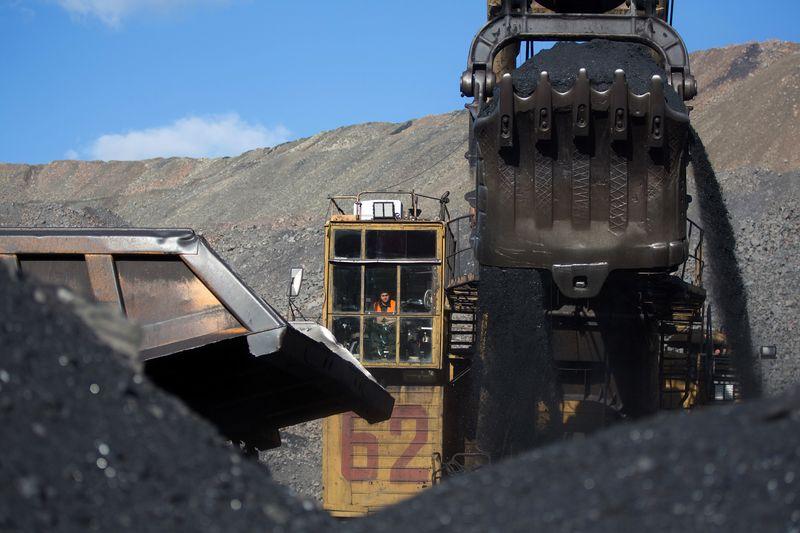As we are closing down mines all over the United States – America is buying “Russian Coal?” I stand with the American Coal Miner! If any of our coal mining family needs help please call me – Don Kaufman – 24/7 – at (970) 947-1776 www.glenwoodattorney.com – Shout out to Craig, Meeker, and Paonia!
Hungry U.S. Power Plant Turns to Russia for Coal Shipment
Mario Parker
July 16, 2014 — 2:30 PM MDT
A driver loads a truck with coking coal during mining operations at the Neryungrinsky mine in Neryungri, Russia. Russian coal is valued by power producers because it’s low in sulfur, enabling plants that haven’t installed equipment to minimize emissions to use the cheaper fuel. Photographer: Andrey Rudakov/BloombergWhen New Hampshire’s largest utility needed to rebuild coal supplies after the past frigid winter, it turned to Russia rather than Appalachia in the U.S. Northeast or Wyoming’s Powder River Basin.
The Doric Victory, a bulk carrier the length of two football fields, transported the fuel almost 4,000 miles (6,436 kilometers) from Riga, Latvia, last month to Public Service of New Hampshire’s Schiller power plant in Portsmouth, a 150-megawatt facility that’s produced electricity since 1952.
Utilities in the U.S. are scrambling for coal, on pace to increase imports 26 percent this year, as railroad bottlenecks slow deliveries and electricity demand climbs with an improving economy. Russia, the world’s third-largest exporter of the fuel, will boost shipments 3.9 percent to 106 million metric tons this year, IHS Energy forecasts, part of President Vladimir Putin’s plan to expand Russia’s role in the global coal market.
“Everyone’s aware that a number of plants have low stockpiles, so you hear Russian coal and they say, ‘Oh wow, people must really be desperate,’” James Stevenson, Houston-based director of North American coal at IHS, said in a July 8 telephone interview.
The New Hampshire utility declined to disclose the amount of coal that it purchased from Russia. U.S. bill of lading data show that 38,500 metric tons of steam coal were delivered.
Russian Coal
“A shipment of coal was contracted from Russia that met our operational and economic needs,” was all the utility was willing to say in an e-mail.
U.S.-Russia relations are at a post-Cold War low after Russia’s annexation of Ukraine’s Crimea. The U.S. and European Union have imposed sanctions on companies and individuals tied to Putin’s inner circle and are considering further penalties.
The Russian fuel appeals to power producers because it emits less sulfur than other coals, making it easier to comply with environmental rules, and has a high heat content, meaning it can produce more power per measure of fuel, Stevenson said.
In 2012, Putin pledged to spend $120 billion in public and private funds to expand Russia’s coal mining capacity and boost exports through 2030. The country has the second-largest reserves behind the U.S., government data show.
Russia’s abundant supply of natural gas, also used to generate electricity, gives it the ability to flood the seaborne coal market, the U.S. Energy Department says. Exports from Russia have swelled 94 percent from January 2010 through May, data compiled by Bloomberg show.
Coal Burning
U.S. utilities burned 30 million tons of coal inventories in the first quarter, EIA data show. March was the coldest for the month since 2002 in the contiguous 48 U.S. states, according to the National Climatic Data center, boosting power demand. In spring, an increase in oil and ethanol transport clogged the railways and slowed efforts by power generators to rebuild supply.
Some utilities have as little as 20 days of reserves, Bill Davison, vice president of thermal coal sales at Alpha Natural Resources Inc., said last month at a conference in New York.
Tennessee Valley Authority temporarily idled the Bull Run plant in May to rebuild supply, Vince Stroud, the company’s director of coal origination, said last month in an interview at the IHS McCloskey Coal USA conference in New York.
Rail Service
Power producers have placed an emphasis on reliability of supply, whether it’s domestic or imported, as they try to increase inventories and navigate spotty rail service, said Frank Kolojeski, director of marketing at Exporting Commodities International Inc., a brokerage in Marlton, New Jersey.
“A lot of companies were reluctant to go out and buy spot coal because they weren’t sure it would get delivered,” he said in a July 2 telephone interview.
The U.S. imported 34 million tons of coal in 2008, a year in which the fuel accounted for 48 percent of electricity generation, government data show. Foreign purchases tumbled to 8.9 million tons by last year as coal’s share of electricity consumption dropped to 39 percent while gas use gained.
Coal buyers, producers and shippers responded to shrinking imports by idling or reallocating equipment, Kolojeski said.
“Everybody had been used to five years of dormancy,” he said. “All of a sudden there was a surge in demand. It caught everybody off guard.”
In December days of coal supply fell below 60 days for the first time since summer 2011, according to the Energy Department’s statistical arm.
Rising Imports
In the first quarter, the most recent period for which data is available, U.S. imports ballooned 71 percent to 2.4 million tons, EIA data show.
Companies in the U.S. are finding bargains because the world is currently oversupplied, Stevenson said. “In some ways the Russian coal was a bird in the hand,” he said.
Thermal coal is used to generate electricity, while the metallurgical variety is needed to forge steel.
Coal at the Australian port of Newcastle, Asia’s benchmark price, is down about 17 percent this year at $69.65 a metric ton. Coal for delivery next year to Northwest Europe is down 11 percent at $77.50. On the New York Mercantile Exchange, prices have increased 5.3 percent to $60.50.
The global seaborne coal market may rise 4.6 percent this year to 997 million metric tons and could reach a record 1 billion tons, the Englewood, Colorado-based information company, estimates. Indonesia is the biggest seller of coal, followed by Australia, according to IHS.
Colombia accounted for 67 percent and Indonesian coal made up 23 percent of U.S. imports in the first quarter, according to EIA. In the lower 48 states, the most foreign shipments have flowed in through Tampa, Florida, followed by Boston, the EIA datashow.
“If you are on the Atlantic Coast, you have a chance to buy imported coal,” Stevenson said. “If you’re a utility you have to act now and throughout the second half of the year in case there’s a colder winter than last year.”
(970) 947-1776 #Abogado #sehablaespañol
https://glenwoodattorney.com/legal-disclaimer/ https://glenwoodattorney.com/privacy-policy/
Donald J. Kaufman, Abogado
2520 Grand Avenue, Suite 110, Glenwood Springs, Colorado 81601-4195
https://g.page/DonaldKaufmanAttorney?share
@donald.j.kaufman.attorney
Publicidad de abogados destinada a su uso únicamente en Colorado. No se pretende ni se crea ninguna relación abogado-cliente. La Oficina Legal de Donald J. Kaufman es un abogado de Compensación Laboral de Colorado que representa únicamente a los trabajadores lesionados que han resultado lesionados en Colorado. Su enfoque es proteger los derechos de los trabajadores lesionados y sus familias. Con más de 27 años de experiencia, Kaufman y su firma han ayudado a miles de trabajadores lesionados de Colorado. El abogado Kaufman ayuda a los trabajadores lesionados en Glenwood Springs, Rifle, Silt, New Castle, Carbondale, Basalt, El Jebel, Aspen, Dotsero, Craig, Meeker, Rangely, Debeque, Minturn, Vail, Eagle, Gypsum, Leadville, Paonia, Frisco, Breckenridge. , Loveland, Denver, Grand Junction y Steamboat. Se habla español. Abogado de Colorado. Kaufman mantiene cámaras de seguridad de audio y video dentro y alrededor de su oficina para proteger a los clientes y las oficinas. El abogado no ofrece garantías expresas o implícitas con respecto a los resultados. Donald J. Kaufman es responsable del contenido de este sitio web. Esta información no debe interpretarse como la prestación de servicios legales, ni como la propuesta de ningún tipo de asesoramiento legal. Cualquiera que esté considerando contratar a un abogado debe investigar de forma independiente las credenciales y la capacidad del abogado, y no debe confiar en anuncios o experiencia autoproclamada. Todo el contenido Copyright 1996-2023 © TM Todos los derechos reservados.
Attorney Advertising intended for use in Colorado only. No Attorney Client relationship intended or created. The Law Office of Donald J. Kaufman is a Colorado Workers’ Compensations Attorney representing only injured workers who have been injured in Colorado. His focus is protecting the rights of injured workers’ and their families. With over 27 years of experience, Kaufman and his firm has helped thousands of injured Colorado Workers. Attorney Kaufman helps injured workers in Glenwood Springs, Rifle, Silt, New Castle, Carbondale, Basalt, El Jebel, Aspen, Dotsero, Craig, Meeker, Rangely, Debeque, Minturn, Vail, Eagle, Gypsum, Leadville, Paonia, Frisco, Breckenridge, Loveland, Denver, Grand Junction and Steamboat. Se habla espanol. Abogado de Colorado. Kaufman maintains security audio/video cameras in and around his office to protect the cleints and offices. Attorney makes no express or implied guarantees concerning any outcomes. Donald J. Kaufman is responsible for the content on this website. This information is not to be interpreted as providing legal services, nor as proposing any form of legal advice. Anyone considering a lawyer should independently investigate the lawyer’s credentials and ability, and should not rely upon advertisements or self-proclaimed expertise. All content Copyright 1996-2023 © TM All rights reserved.








